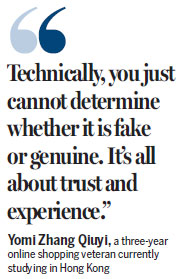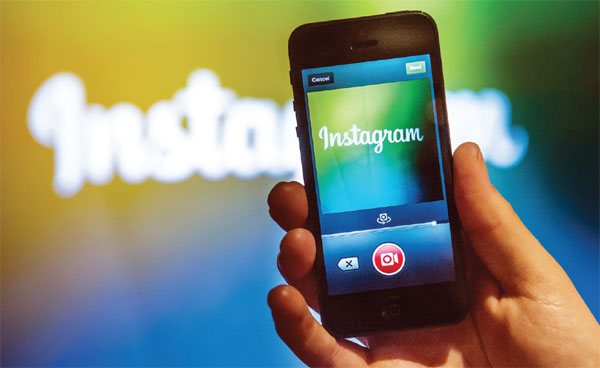Instagram shoppers may have genuine cause for concern
Updated: 2015-02-12 07:18
By Wiki Su for China Daily(HK Edition)
|
|||||||||
|
Some Instagram sellers are exploiting the gray areas in local laws to promote fake goods. David Paul Morris / Bloomberg |
"Technically, you just cannot determine whether it is fake or genuine. It's all about trust and experience," comments Yomi Zhang Qiuyi, a three-year online shopping veteran currently studying in Hong Kong.
The undergraduate from Jiangsu province, East China, is talking about overseas purchasing proxy services offered via Instagram, a photo-sharing community serving more than 300 million monthly active users worldwide.
Hong Kong, an international finance center, has Asia's second-largest stock exchange after Japan, and also operates one of the world's busiest ports. It is home to six billionaires ranked within the world's top 100. Yet the city has so far been unable to offer a universal and standard online shopping platform for local consumers.
This lack of mainstream e-commerce sites has seen the arrival in Hong Kong of a slew of individual "Instagram sellers", peddling a range of products including clothes, cosmetics and handbags.
They will post sample pictures of products on their Instagram page, allowing their followers to go on an online "window shopping" spree. Customers interested in any product can refer to the sellers' contact details for further inquiries, normally through messaging apps such as WeChat, WhatsApp or Line.
Once the deal is confirmed, buyers need wait for a week or two. When their desired goods arrive in Hong Kong, the seller will notify the customer and fix a meeting somewhere, usually an MTR station, to close the transaction and hand over the goods to the buyer.
These Instagram sellers usually claim that their goods, which are affordably priced, are 100 percent authentic, and shipped directly from Japan, South Korea, Taiwan or Europe.
"I think it is quite difficult to determine whether it is really imported from South Korea because sometimes it is from the mainland but they label it as 'made in South Korea'," says Iris Tong, a university undergraduate with Instagram shopping experience.
Two out of three Instagram sellers interviewed refused to disclose where and how they get their inventories.
The remaining shopkeeper revealed that she makes her purchases from Gmarket.com, a South Korean online auction and shopping website, and resells the products to Instagram shoppers. That is, she acts as an agent between the local buyer and foreign online shopping portal.
Despite the reluctance to reveal the channels for obtaining their goods, most Instagram sellers will emphasize that they do not source from Taobao, the hugely popular online shopping website of Alibaba Group Holdings.
In the eyes of Zhang, people in Hong Kong seem biased against Taobao, and they think all products featured there are fake and of low quality. On the other hand, products not from Taobao are authentic and of good quality, they believe, even though the price may be incredibly lower than market rates.
Ironically, Instagram pages such as @fake_products_report or @hkfakelist also exist, which report Instagram accounts selling fake products.

In September, local media reports told of a case where the products, though claimed as authentic, were actually counterfeits purchased from Taobao at an even lower price.
Gray areas in local laws actually offer room to these Instagram sellers to flourish. They are not answerable to any regulatory organization other than the Customs and Excise Department of the SAR government.
The department is responsible for enforcing the Trade Descriptions Ordinance (Chapter 362) and its eight pieces of subsidiary legislation that aim to protect consumers by prohibiting false trade descriptions, false, misleading or incomplete information and misstatements with respect to goods provided in the course of trade, by way of surprise checks.
The Hong Kong Consumer Council, on the other hand, only deals with cases between businesses and customers, and customer to customer disputes such as over Instagram sales do not fall within their scope.
Said Zhang: "The payment system is not secure like Alipay or Paypal, and I can neither return nor change goods bought on Instagram. It is impossible for me to make last-minute decisions, as once the seller orders the goods, I just cannot change my mind."
"It is necessary for Hong Kong to establish a universal online shopping website with normative services that could guarantee customer rights, especially when local people have quite a strong brand awareness," said Su Lei, assistant professor in the Department of Marketing at Hong Kong Baptist University.
The more frequently local customers purchase brands, the more likely they are to encounter counterfeit products, as there will be more high quality fake products or so called "A-Jade products" that the general public will likely be unable to identify, according to Su.
"I cannot figure out whether products on Instagram are really prestigious overseas brands. Price and quality matter more," said Zhang. "Therefore I prefer to use Taobao. After all it is a mature platform with a range of services."
She lists some functions that improve the shopping experience for users, including international transit services that lower delivery costs for local buyers.
In addition to this, Taobao has a "buyer feedback section" where one can post comments on the sellers' products and services, as well as photos of the goods received. Such comment functions do not exist on Instagram shopping pages.
The reason why such a niche online shopping channel has a market is that local people seek products that are difficult to buy where they live. Now that such demand is showing no signs of fading, a standardized online shopping platform should be created, according to Su.
(HK Edition 02/12/2015 page9)
